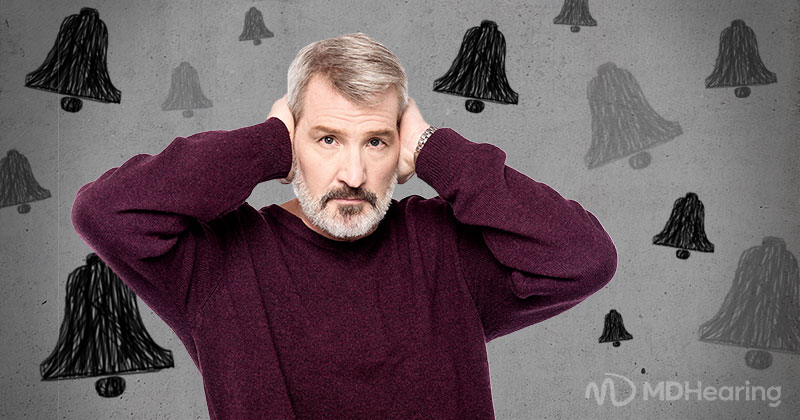Have you ever experienced a ringing or buzzing in your ears after spending hours at a loud concert? Do you sometimes hear these annoying sounds randomly or for no apparent reason? For many, this fades after a couple of hours or days. But for some, this condition—known as tinnitus—is permanent.
Tinnitus is a common problem affecting millions. Tinnitus is also more common as you age, and the prevalence increases from 10% for young adults to 24% for older adults.
Tinnitus can be an immense pain and cause sleep, concentration, emotional, thought process, and hearing issues. So, what is tinnitus, how it is connected to hearing loss, and should you get hearing aids for tinnitus? We’ll cover all that and more in this article.
What Is Tinnitus?
Tinnitus ("ringing in the ear") is a condition that triggers a sound inside your head that has no external source where it’s coming from.
When your ear or auditory nerves are damaged, sometimes the brain compensates for the lack of sounds from the outside world. It does this by making the auditory system more active, producing the ear's ringing or buzzing sounds.
There are different types of tinnitus:
Subjective Tinnitus – The majority of people with tinnitus have subjective tinnitus, which means only they can hear the sounds.
Objective Tinnitus – In rare cases, some people have objective tinnitus due to underlying medical conditions. This kind of tinnitus pulsates, often matching their heartbeat, and can be heard by others.
Somatosensory Tinnitus– People with somatosensory tinnitus experience ringing in the ear or sound quality changes either when they move their head, neck, or eyes or touch certain parts of their body.
Symptoms of Tinnitus
People experience tinnitus in different ways and forms, so symptoms vary from person to person. Tinnitus can be heard as ringing, buzzing, whistling, clicking, chirping, humming, roaring, shrieking, or hissing. In some people, tinnitus switches between these types of sounds.
Some people with tinnitus feel that the sound is coming from a distance, even though it seems to have no source and is present in various environments. It can be a steady sound, or intermittent.
Tinnitus can occur in one ear, both ears, or inside your head. However, tinnitus in one ear, or tinnitus that suddenly changes, is abnormal and should be evaluated by an ENT.
Whatever the case, tinnitus can be distracting and irritating. More importantly, it may be a symptom of an underlying condition, including hearing loss.
The Connection Between Tinnitus and Hearing Loss
It's possible to experience tinnitus without hearing loss or vice versa. However, the majority of those who suffer from chronic tinnitus also have some degree of hearing loss.
An early study in France determined a correlation between tinnitus and hearing loss experiences. For example, age- or noise-related hearing loss was typically accompanied by a constant, high-pitched tinnitus sound. In contrast, hearing loss due to Meniere’s disease typically coincided with a fluctuating, low humming sound. Researchers also found that the perceived loudness of the sound produced by tinnitus has a strong association with the degree of hearing loss.
More recent studies indicated a strong link between tinnitus severity and hearing loss. People with no tinnitus or low- to medium-frequency tinnitus (125∼2,000 Hz) have better hearing, whereas those with high-frequency tinnitus (3,000∼8,000 Hz) have worse hearing.
Causes of Tinnitus and Hearing Loss
Scientists don’t know exactly what causes tinnitus, but like general hearing loss, tinnitus has been linked to:
Exposure to loud noises
Earwax buildup
Ear and sinus infections
Migraine headaches and head injuries
Certain types of tumors in or around the ear or in the brain
Otosclerosis
Meniere’s disease (including chronic vertigo and other health problems)
High doses of caffeine and cigarette use
Certain drugs or medications (e.g., aspirin, NSAIDs, antibiotics, antimalarials, anticonvulsants, cancer drugs, diuretics, and antidepressants)
Anemia
Heart disease and hypertension
Thyroid abnormalities and hormonal changes
Vascular disease
Temporomandibular joint (TMJ) disorders
Stress
Protect Your Hearing To Prevent Tinnitus
Tinnitus often goes away on its own and may not cause you any permanent problems. In other cases, chronic tinnitus can become more than an annoyance. If left untreated, it can interfere with one's ability to sleep, concentrate, work, and even lead to distress and depression. Protecting your hearing from loud noises is one of the best ways to prevent tinnitus.
You can protect your ears in the following ways:
Use hearing protection when loud noises can't be avoided (e.g., ear plugs, ear muffs)
Distance yourself from loud noises when possible
Keep the volume down on the headphones, radio, TV, etc.
Give your ears a break from loud music or noise
Avoid activities and places that are loud and noisy
The effects of a loud noise depend on how loud it is and how long you’re exposed to it. The best hearing protection is to avoid loud noises altogether.
How Hearing Aids Can Help With Tinnitus
Because tinnitus and hearing loss are closely linked, many people can manage hearing loss and tinnitus with hearing aids.
When wearing hearing aids, your auditory system is adequately stimulated, and the brain no longer needs to compensate for absent noise. Recent studies have suggested that hearing aids help patients with tinnitus by reducing the stress associated with straining to hear. As a result, you can more easily adapt to the tinnitus, and it becomes less noticeable. Hearing aids can also amplify background noise to your comfort level, which helps mask sounds produced by tinnitus.
If you think you might suffer from hearing loss, take our free online hearing test and receive the results immediately. Online hearing tests offer convenience, as they can be taken from the comfort of your home.
You don’t need to break the bank to help ease your tinnitus, hearing loss, and other auditory problems. MDHearing cuts out the middleman, making hearing aids affordable for everyone. Compare our FDA-registered hearing aids and see why our customers rave about them. We offer a 45-day risk-free trial with a 100% money-back guarantee and lifetime support from licensed hearing professionals.
Browse our hearing aid options and try MDHearing risk-free!
COMPARE OUR HEARING AIDS

